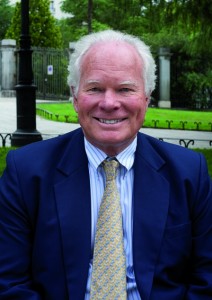December 19, 2011
A word from Ross Mountain: December 2011
 Amid the ongoing debate for substantial cuts to the State Department’s foreign aid budget based on the argument that it has been a poor investment without the expected results, it is crucial that legislators in Congress are fully aware of the vital role the US plays as the world’s largest humanitarian donor. The failure of the Congressional “Super Committee” to reach an agreement on how and where to make budget cuts makes this even more urgent.
Amid the ongoing debate for substantial cuts to the State Department’s foreign aid budget based on the argument that it has been a poor investment without the expected results, it is crucial that legislators in Congress are fully aware of the vital role the US plays as the world’s largest humanitarian donor. The failure of the Congressional “Super Committee” to reach an agreement on how and where to make budget cuts makes this even more urgent.
Unfortunately, the foreign aid budget is often the first to be targeted for cuts in times of austerity, despite its modest size. While humanitarian assistance represents a minor part of this budget – only 0.036% of the United States’ Gross National Income – it is critical live-saving aid for people affected by disaster and conflicts. Legislators need to consider the implications of any reductions on the world’s poorest and most desperate before they reach any decisions.
Perhaps if somebody could help US legislators see, as an angel did with George Bailey in It’s a Wonderful Life, what would have happened without US humanitarian aid, their outlook would be different. For instance, in Pakistan hundreds of thousands of families would not have had shelter following the 2010 floods which covered one fifth of the country in water and mud. In Haiti, countless more displaced persons would have died from the cholera epidemic that confronted a country already devastated by an earthquake without precedent. In Somalia and the rest of the Horn of Africa, many thousands of mothers would have no water or food for their children refugees from a country which has not known peace for over twenty years.
US aid has made a difference in the lives of millions of people from the slums in Port- au-Prince to the displaced camps in Darfur. However that is not to say it could not be more effective. But at the end of the day, the effectiveness of humanitarian assistance is not, as some argue, about whether the millions of dollars provided to assist those affected by the Pakistan floods have brought about improvements in the security situation in Pakistan or whether the funding of food aid in the Horn of Africa is inappropriate because radical Islamists still control much of Somalia, or if the Haiti cholera response has improved governance in that country.
Measuring humanitarian assistance against non-humanitarian – often frankly political – criteria and, on that basis, concluding that is inefficient and thus deserving of significant cuts defies the basic human objective of such aid – to save lives and alleviate suffering of those in dire need, impartially and independently of political, strategic or economic considerations. The only relevant return of investment in humanitarian aid should be saving lives and alleviating suffering. Observing such considerations is how to make the most efficient use of such funds.
Other donors, such as the United Kingdom, have committed to increasing their aid budget despite austerity measures on the basis that those in need should not suffer disproportionately. Being the world’s largest economy and the largest humanitarian donor in absolute terms, the US holds a position of leadership and influence not only with communities to which it provides life-saving assistance, but also vis a vis other donor governments. By maintaining its humanitarian assistance funding, the US encourages similar efforts from other countries.
On the other hand, reductions could well be followed by other governments multiplying the negative effect on a humanitarian system that is already stretched to meet the increasing needs caused by civil conflicts, droughts and disasters, especially in Africa. As a senior representative of a UN aid agency told us, “a funding cut from a smaller donor is a challenge, but a cut from the US means millions of people would not receive the humanitarian assistance they need to survive. No other donor could pick up the slack.”
So, if US aid is under scrutiny, let it be for the right reasons. Our Humanitarian Response Index, which examines main donor governments’ response to humanitarian crises worldwide, shows that the US has a lot to be proud of in terms of its humanitarian assistance. But it also highlights that there are ways to improve the efficiency of foreign assistance in line with humanitarian principles and good donor practices, without damaging its core purpose -and the good name of the United States as a generous and responsive donor when misfortune strikes.
A number of initiatives to reform and improve US foreign assistance are currently under debate in the US. Rather take the simplistic approach of indiscriminately cutting budgets without thinking through the consequences, these initiatives deserve careful consideration and political support. They are much more likely to succeed in generating real value for money and lasting results from already tight humanitarian aid budgets, and a much better alternative than trying to deal with the inevitable consequences that aid cuts would mean in terms of human suffering and vulnerability.
There is no need for an angel to explain that US humanitarian assistance is irreplaceable. We have enough evidence for this.
Share this